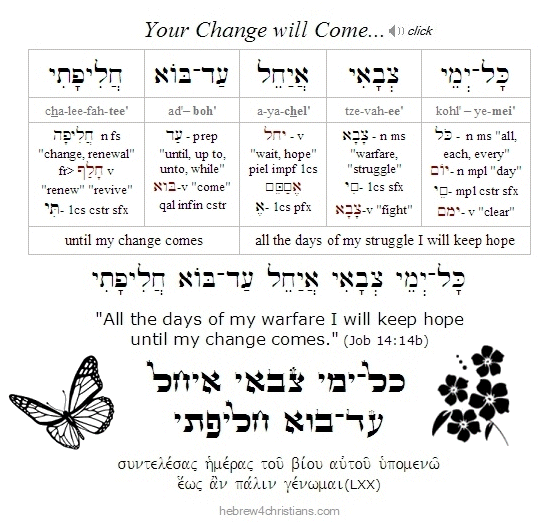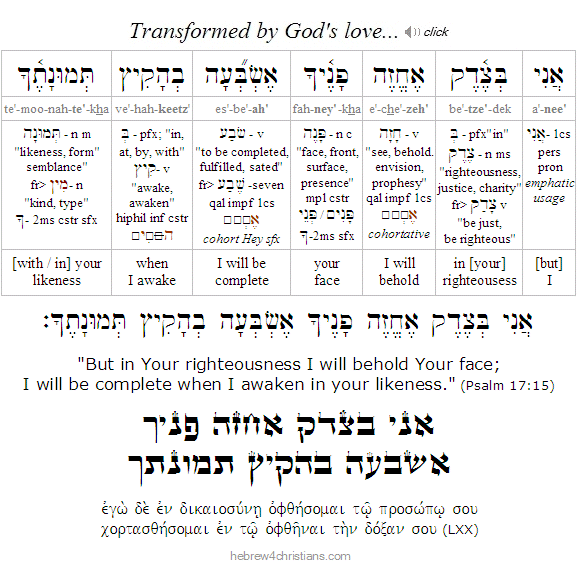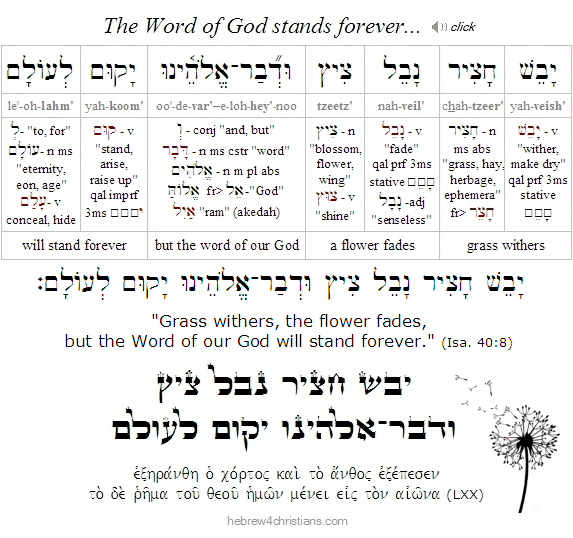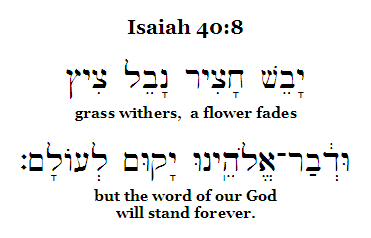|
One thing that is certain in this world is that what we see with our physical eyes is constantly in a state of flux and change. In philosophical jargon, this ephemeral world is "radically contingent," which means that it is "not necessary" and therefore subject to decay and dissolution. Regarding man it is written, "his days are like grass; he flourishes as a flower of the field; for the wind passes over it, and it is soon gone" (Psalm 103:16).
But how are the metaphors that man is "like dried up grass" or a "withered flower" intended to comfort us? Do they not, on the contrary, lead us to regard our lives as vain and perhaps meaningless? Yes indeed. Our lives are empty and vain apart from God and His truth. If we find ourselves wincing over such images, it is perhaps time to reexamine the state of our faith: To the extent that we regard this world as our "home" we will find the transience of life to be tragic... For those who are seeking a heavenly habitation, the "City of God" and the fulfillment of the promise of Zion, the fleeting nature of this evil world is ultimately a form of consolation...
ūöūĢų╣ūōų┤ūÖūóųĄūĀų┤ūÖ ūÖų░ūöūĢųĖūö ū¦ų┤ū”ų╝ų┤ūÖ
ūĢų╝ū×ų┤ūōų╝ųĘū¬ ūÖųĖū×ųĘūÖ ū×ųĘūöųŠūöų┤ūÖūÉ
ūÉųĄūōų░ūóųĖūö ū×ųČūöųŠūŚųĖūōųĄū£ ūÉųĖūĀų┤ūÖ
ho┬Ędee┬Ęei'┬Ęnee ┬Ę Adonai ┬Ę keetz┬Ętzee
oo┬Ęmeed┬Ędaht ┬Ę ya┬Ęmai ┬Ę mah ┬Ę hee
eid┬Ę'ah ┬Ę meh ┬Ę cha┬Ędel ┬Ę a'┬Ęnee

"O LORD, make me to know my end
and what is the measure of my days;
let me know how quickly my life will pass"
(Psalm 39:4)
King David continues, "Behold, you have made my days a few handbreadths, and my lifetime is as nothing before you (ūĢų░ūŚųČū£ų░ūōų╝ų┤ūÖ ūøų░ūÉųĘūÖų┤ū¤ ūĀųČūÆų░ūōų╝ųČūÜųĖ). Surely all mankind stands as a mere vanity (ūöųČūæųČū£)! Selah" (Psalm 39:5).
These metaphors concern the world we see with our senses ŌĆō the physical world of decay - but not the eternal realm of the Spirit. The glory King Solomon is likened to a lilly of the field, and dried grass is used to "stoke the oven" (Matt. 6:28-30), and yet precisely because our Heavenly Father cares for grass and flowers, can we trust in His providential care for our eternal souls...
Understanding that every breath and every heartbeat is an irreplaceable gift given to you from God is sobering and helps focus the soul's affections. This is one of the "rock bottom" issues of life: There is a God, and you are not Him; and one day you will die and give account for the lease you were given on life... May it please God to help us "redeem the time," for the days are evil (Eph. 5:16; Col. 4:6).
The Spirit of the LORD says, "Do not turn aside from following the LORD, but serve the LORD with all your heart. And do not turn aside after empty things that cannot profit or deliver, for they are "tohu" - confusion and unreality" (1 Sam. 12:20-21)
The western mind confuses the idea of "fact" with truth. A fact is the disclosure of a correspondence between an idea and reality, but Truth (with a capital "T") encompasses how any given fact is related to the whole. Such Truth is therefore intimately connected with wisdom, and wisdom is first of all about the reverential awe of God (Psalm 110:10). It is not what we see with our eyes that is ultimately real, but what we see with our hearts.
The carnal mind is instinctively afraid of change, since it implies death and dissolution, and therefore it reasons from a continuous state of dread (whether conscious or not). Hence the "besetting sin" of the flesh is to "absolutize" the moment and to otherwise regard the finite as an end in itself. Woody Allen once quipped, "I am not afraid of death, I just don't want to be there when it happens," which is precisely the abhorrence the carnal mind expresses toward change. Change represents a movement toward an otherwise unavoidable end, and therefore the carnal mind constantly seeks escape from the journey.
God is our "Rock," a metaphor that implies that He is the immovable foundation and cornerstone of all reality. God is our strong refuge in the stormy changes we all face in this world. His Presence both grounds us and sustains our way. Nonetheless we walk by faith, not by sight, and often the sojourner in this world faces testing and even tribulation. In his despair, Job once asked, "If a man dies, shall he live again? All the days of my warfare I will wait until my change comes" (Job 14:14).
ūÉų┤ūØųŠūÖųĖū×ūĢų╝ū¬ ūÆų╝ųČūæųČū© ūöų▓ūÖų┤ūŚų░ūÖųČūö
ūøų╝ųĖū£ųŠūÖų░ū×ųĄūÖ ū”ų░ūæųĖūÉų┤ūÖ ūÉų▓ūÖųĘūŚųĄū£ ūóųĘūōųŠūæų╝ūĢų╣ūÉ ūŚų▓ū£ų┤ūÖūżųĖū¬ų┤ūÖ
eem-ya┬Ęmoot ┬Ę ge'┬Ęver ┬Ę ha-yeech┬Ęyeh?
kol-ye┬Ęmei ┬Ę tze┬Ęva┬Ęee ┬Ę a┬Ęya┬Ęchel ┬Ę ad-boh ┬Ę cha┬Ęlee┬Ęfa'┬Ętee

"If a man dies, shall he live again? All the days of my warfare (ū”ų░ūæųĖūÉų┤ūÖ)
I will wait until my change comes"
(Job 14:14)

Notice that the word for "change" (ūŚų▓ū£ų┤ūÖūżųĖūö) refers to a change of garments, which pictures the robes that Joshua ben Yehotzadak, the Kohen Gadol, was given when he stood accused before the Angel of the LORD (Zech. 3:3-5). We want to be fully clothed with the garments of God's righteousness that are imputed to us through faith. Our groaning for complete deliverance from the affect of our sins is further evidence of the inner vision we have been given by the Holy Spirit.
ūÉų▓ūĀų┤ūÖ ūæų╝ų░ū”ųČūōųČū¦ ūÉųČūŚų▒ū¢ųČūö ūżųĖūĀųČūÖūÜųĖ
ūÉųČū®ūéų░ūæų╝ų░ūóųĖūö ūæų░ūöųĖū¦ų┤ūÖūź ū¬ų╝ų░ū×ūĢų╝ūĀųĖū¬ųČūÜųĖ
a┬Ęnee ┬Ę be┬Ętze'┬Ędek ┬Ę e┬Ęche┬Ęzeh ┬Ę fa┬Ęne'┬Ękha
es┬Ębe┬Ęah ┬Ę ve┬Ęcha┬Ękeetz ┬Ę te┬Ęmoo┬Ęna┬Ęte'┬Ękha

"As for me, I shall behold your face in righteousness;
when I awake, I shall be satisfied with your likeness"
(Psalm 17:15)

Our verse sets up a great contrast between olam ha-zeh and olam haba ŌĆō between this present world and the heavenly realm. Unlike the grass of the field that dries up or flowers that soon wither, the word of God stands forever. Despite the frailty of man and the inevitability of physical death, God's truth endures, and this is a foundation upon which we can rest. As Yeshua said, "heaven and earth shall pass away, but my words will never pass away" (Matt. 24:35). The message of Yeshua is more enduring that even creation itself.
Press on in the good fight of faith, chaverim.... Believing is seeing, not the other way around. "Keep yourselves in the love of God, waiting for the mercy of our Lord Yeshua the Messiah that leads to eternal life." (Jude 1:21)
|






